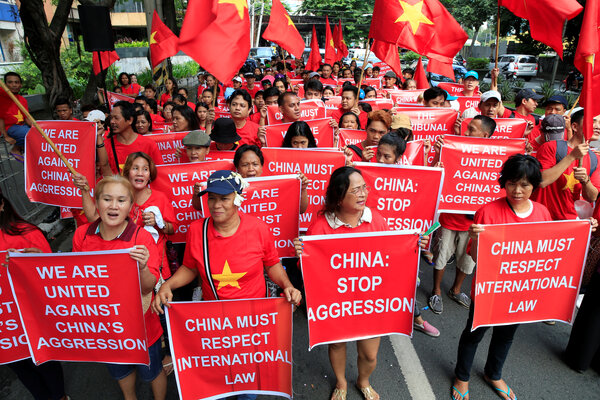Opinion: How the South China Sea fight could go digital
China's growing technological prowess gives it many opportunities to use cybercapabilities to press territorial claims. That's why the US needs sharper policies to counter digital provocations.
After The Hague ruled in July against China's territorial claims in the South China Sea, the world has been watching to see how Beijing will react.
While it's unlikely China will risk starting a war with the US and the West with any kind of physical strike, Beijing may look to its growing capabilities in the virtual realm – cyberspace – as a lower-cost and lower-risk way to achieve its territorial goals, solidifying claims in the East and South China Seas.
It's a strategy that would allow China to operate nonlinearly across physical and virtual domains, taking a page from Russian President Vladimir Putin's playbook by using measures short of war to establish greater control over nearby states and territories.
Recommended: Watch: The art of cyberwar
At the end of 2015, Chinese President Xi Jinping announced the formation of the Strategic Support Force (SSF) that would house, among other functions, "cyber offense and defense" forces in a supportive role. At least one researcher called the SSF an independent "fifth military service."
It remains to be seen how China will use the SSF, but territorial disputes with its neighbors could be a useful opportunity to both practice conducting information operations in cyberspace to press Beijing's agenda and test the international community's response to those efforts.
New technologies – both pilfered and developed indigenously – have greatly improved China's military capability in a relatively short time period, placing Beijing in the best position to shape Asia in the past 175 years. The continued pursuit of President Xi's "China Dream" and the impending centennial of the Communist Party of China in 2021 both incentivize decisive – and potentially aggressive – activity to shore up territorial claims in order to project national strength.
The stated importance of technology in future conflicts combined with a change in focus away from intellectual property theft means we should expect a significant cyber operations component to Beijing's statecraft, both for political espionage and attack, for the foreseeable future.
The SSF will allow Beijing to concentrate and more effectively use its growing cybercapabilities while ensuring improved command and control, opening up new options for coercing competitors or supporting quasi-military action.
Recommended: Why China hacks the world
China's civilian and military leadership have seen the weak response to Russian aggression in Ukraine, as well as the Russian military's skillful use of hybrid warfare tactics to successfully annex Crimea. Just as China's military leaders learned from the US military's dominance during the first Gulf War, they will similarly learn from Russia’s success in seizing territory, frustrating a unified global response, and – critically – avoiding a full-blown conflict.
We have already witnessed several examples of China's demonstrated capability and intent to use cyber operations to shape narratives and express its displeasure with foreign government policy.
While disruptions to Vietnamese airport check-in screens in July wereblamed on a Chinese patriotic hacking group known as "1937cn," we still do not know to what extent this group operates autonomously or with Beijing's tacit approval. Hybrid warfare calls for the use of irregular forces (in this case putative criminal elements) and tactics (such as targeting civilian entities) to achieve objectives. In the future, the SSF could be called upon to carry out these types of operations against not only military but civilian and private sector targets as well.
Considering that China lost a border war against Vietnam in 1979, China's leaders may opt for measures short of war to influence Hanoi’s behavior rather than risk another conflict.
Beijing has also observed that the West has struggled to formulate consistent and effective policy responses to aggressive activity in domains with which it is not comfortable. While the US can use freedom-of-navigation operations to respond to China's artificial island construction, its set of viable policy response options to China's influence operations in cyberspace is less apparent.
It also remains unclear at what threshold of aggressive action in cyberspace the US would fulfill its defense treaty obligations to both Japan and the Philippines, as well as how Washington would respond to similar activity against a non-treaty country, such as Vietnam. Economic sanctions are relatively simple to impose on North Korea, Iran, or Russia — all countries with which the US has few economic ties — but it remains to be seen to what extent Washington would punish China.
The US needs a more specific, public strategy on how it intends to respond to lower-threshold provocations in cyberspace directed at itself or its allies. This is important not only for holding adversaries in check but also for reassuring allies that Washington will support them, and identifying under what circumstances they can expect it.
Without a clear set of policies, China and other actors will find using their growing capabilities in cyberspace to be an effective and low-cost means of bolstering their own relative power at the expense of the US and the international order.

No comments:
Post a Comment
Comments always welcome!